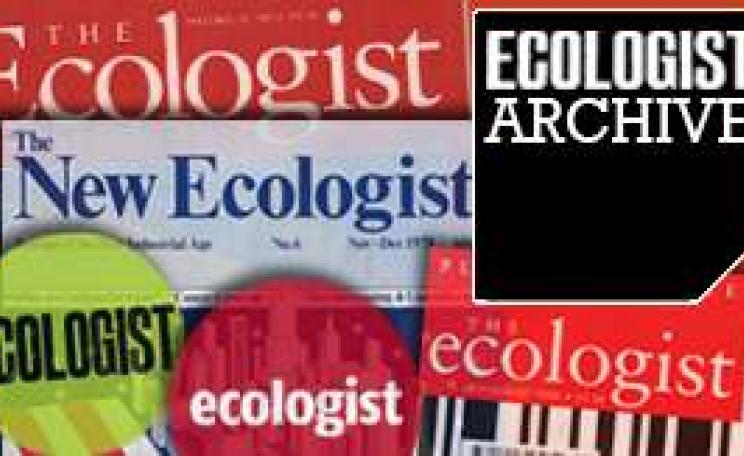Described by the New York Times in 1988 as the ‘prophet of rural America', Look and See pays tribute to Wendell Berry's philosophy and lifetime commitment to the land
‘Look and see' was the gentle instruction that Berry gave to his young daughter, Mary, as he shared with her the world around them. In 1965, when she was seven years old, Berry returned his family home to Kentucky after living in California, Europe and New York, turning away from the literary and academic path chosen by many American writers to farm, as five generations of his family had done before him. He, with his wife Tanya, began a life of farming, writing and teaching and, in the last half century, he has seen Henry County, like many rural communities across America, become a place of quiet ideological struggle.
In the span of a generation, the agrarian virtues of simplicity, land stewardship, sustainable farming, local economies and rootedness to place have been replaced by a capital-intensive model of industrial agriculture characterised by machine labour, chemical fertilisers, soil erosion and debt - all of which have frayed the fabric of rural communities.
Filmed across four seasons in the farming cycle, Look and See blends observational scenes of farming life, interviews with farmers and community members with beautiful footage of the surrounding landscape interspersed with stills from Kentucky photographer, poet and writer friend James Baker Hall, and archive coverage of Berry speaking at the Agriculture for a Small Planet Symposium on July 1st 1974. It was Berry's talk at this event that led indirectly to the establishment of the Tilth Alliance - to build an ecologically sound, economically viable and socially equitable food system - and a conference on Alternative Agriculture in Ellensberg, Washington the following November.
In Berry's poetry collection A Timbered Choir: The Sabbath Poems, he coins the military phrase ‘for the sake of the objective' to describe a kind of war waged on America's land by the industrialisation of farming, and this served as something of a lodestar for Look and See's director, Laura Dunn, who uses Berry's narration of his poem in the film: ‘I visited the offices where for the sake of the objective/the planners planned at blank desks set in rows./I visited the loud factories where the machines were made/that would drive ever forward toward the objective./I saw the forest reduced to stumps and gullies;/I saw the poisoned river-the mountain cast into the valley;/I came to the city that nobody recognized because it looked like every other city.'
It was in 1974, 12 years after publication of Rachel Carson's Silent Spring and four years after the first Earth Day, that the US Department of Agriculture's promotion of the industrialisation of farming, advocated by the then Secretary of Agriculture Earl Butz, drastically changed federal agriculture policy and led to the demise of small, family-run and community-based farms. This policy, based on mass mechanisation of farming and profit-led, changed the profile of American farming forever.
Described by the New York Times in 1988 as the ‘prophet of rural America', Look and See pays tribute to Wendell Berry's philosophy and lifetime commitment to the land
Previously an agrarian nation, with a commitment and attachment to the land - where 45% of the population farmed - today in America that figure is just 4%, and the number of farms has more than halved with 5.65m farms becoming just 2.17m. As Berry notes, all the traditional standards of farming have been replaced by technology ‘whose only standard is profit' and a rise in soil erosion, toxicity and polluted rivers.
In 1977, disturbed that technology had made the relationship between people and land increasingly irrelevant, Berry wrote his classic work The Unsettling of America, eloquently arguing that good farming is a cultural development and spiritual discipline, while agribusiness takes it out of its cultural context and away from communities. As a result, and even more so today, he argued that America is estranged from the land, its intimate knowledge, love and care for it. For Berry, the words of W B Yeat's poem The Second Coming were ringing true: ‘the centre cannot hold'.
For Steve Smith, Berry's son-in-law, it was this book and Eliot Coleman's 1989 publication, The New Organic Grower, which contributed to his own farming ethos. A contributor to the film, Smith is pragmatic but hopeful and believes that, ‘with a little bit of care, the land will respond', as he and Mary continue to farm in a way that is sustainable, while also running the Berry Center, custodians for their three daughters and the generations to come.
Described by the New York Times in 1988 as the ‘prophet of rural America', Look and See pays tribute to Wendell Berry's philosophy and lifetime commitment to the land, but it is his poetry that may first bring many of us this increasingly relevant conversation captured so lyrically in Laura Dunn's new film.
Look and See is directed by Laura Dunn, produced by Robert Redford and Terrence Malick and released in the United States in July.
The Unsettling of America, A Timbered Choir: The Sabbath Poems and other works by Wendell Berry are published by Counterpoint Press.
This Author
Harriet Griffey is Cultural Editor at The Ecologist and also editorial consultant to One Hand Clapping magazine.







